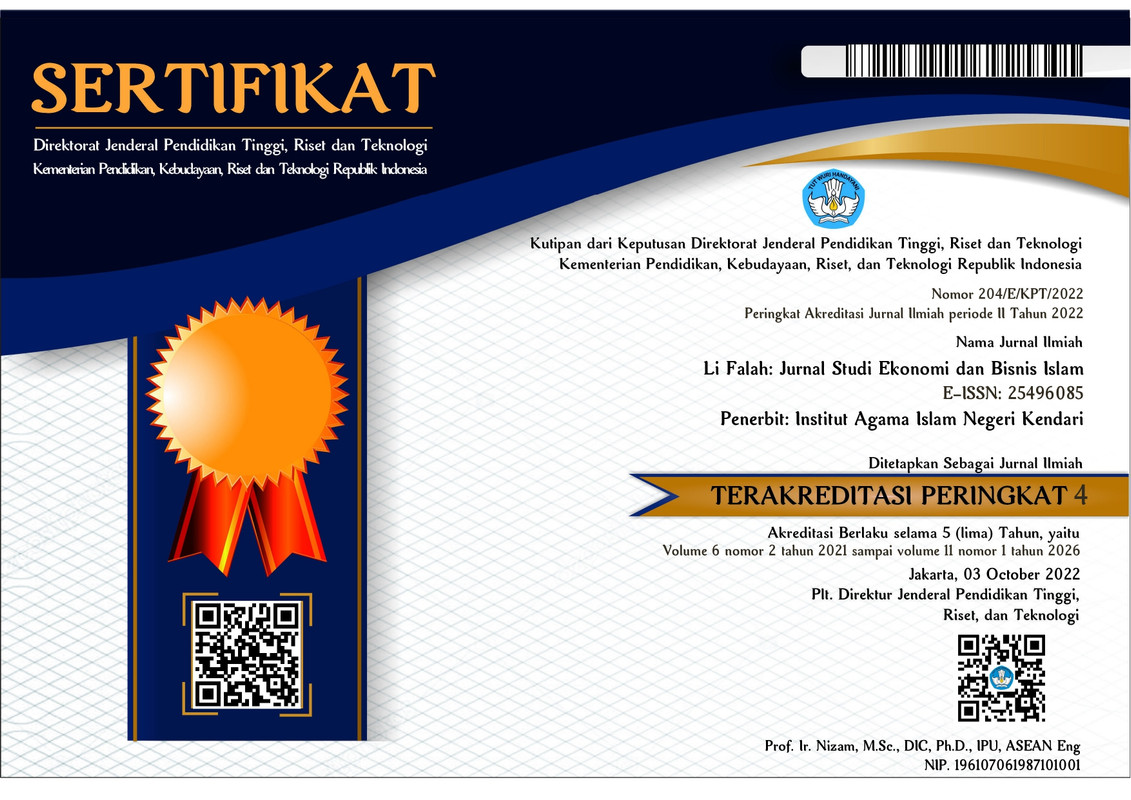Customer Loyalty Through Satisfaction, Engagement, and Trust: A Study in Islamic Banking in South Sulawesi, Indonesia
Abstract
Keywords
Full Text:
PDFReferences
Adam, D. R., Ofori, K. S., Okoe, A. F., & Boateng, H. (2018). Effects of structural and bonding-based attachment on brand loyalty. African Journal of Economic and Management Studies, 9(3), 305–318. https://doi.org/10.1108/AJEMS-10-2017-0252
Afif, N. C., Sutikno, D. U., Hardiyanto, N., & Shiratina, A. (2015). Buliding Brand Through Increasing Brand Trust and Brand Affect. International Journal of Scientific and Technology Research, 4(11), 336–340.
Agyei, J., Sun, S., Abrokwah, E., Penney, E. K., & Ofori-Boafo, R. (2020). Influence of Trust on Customer Engagement: Empirical Evidence From the Insurance Industry in Ghana. SAGE Open, 10(1). https://doi.org/10.1177/2158244019899104
Amin, M., Isa, Z., & Fontaine, R. (2013). Islamic banks: Contrasting the drivers of customer satisfaction on image, trust, and loyalty of Muslim and non-Muslim customers in Malaysia. International Journal of Bank Marketing, 31(2), 79–97. https://doi.org/10.1108/02652321311298627
Awan, A., & Rehman, A. (2014). Impact of Customer Satisfaction on Brand loylty - an Empirical Analysis of Home Appliances in Pakistan. Journal of Chemical Information and Modeling, 2(8), 18–32. https://doi.org/10.1017/CBO9781107415324.004
Boonlertvanich, K. (2019). Service quality, satisfaction, trust, and loyalty: the moderating role of main-bank and wealth status. International Journal of Bank Marketing, 37(1), 278–302. https://doi.org/10.1108/IJBM-02-2018-0021
Brodie, R. J., Hollebeek, L. D., Jurić, B., & Ilić, A. (2011). Customer engagement: Conceptual domain, fundamental propositions, and implications for research. Journal of Service Research, 14(3), 252–271. https://doi.org/10.1177/1094670511411703
Chiguvi, D., & Gurowo, P. T. (2017). Impact of Customer Satisfaction on Customer Loyalty in the Banking Sector. International Journal of Scientific Engineering and Research (IJSER), 5(2), 55–63. https://doi.org/10.1108/17542731211270052
Daud, A., Farida, N., . A., & Razak, M. (2018). Impact of customer trust toward loyalty: the mediating role of perceived usefulness and satisfaction. Journal of Business & Retail Management Research, 13(02), 235–242. https://doi.org/10.24052/jbrmr/v13is02/art-21
de Ruyter, K., & Bloemer, J. (1999). Customer loyalty in extended service settings. International Journal of Service Industry Management, 10(3), 320–336. https://doi.org/10.1108/09564239910276917
El Naggar, R. A., & Bendary, N. (2017). The Impact of Experience and Brand trust on Brand loyalty, while considering the mediating effect of brand Equity dimensions, an empirical study on mobile operator subscribers in Egypt. The Business and Management Review, Volume 9 N(2), 16–25. http://www.abrmr.com/myfile/conference_proceedings/Con_Pro_73986/conference_39354.pdf
Ghozali, I. (2014). Structural Equation Modeling, Metode Alternatif dengan Partial Least Square (PLS). Badang Penerbit Universitas Semarang.
Hapsari, R., Clemes, M. D., & Dean, D. (2017). The impact of service quality, customer engagement and selected marketing constructs on airline passenger loyalty. International Journal of Quality and Service Sciences, 9(1), 21–40. https://doi.org/10.1108/IJQSS-07-2016-0048
Kandampully, J., & Suhartanto, D. (2003). The role of customer satisfaction and image in gaining customer loyalty in the hotel industry. Journal of Hospitality and Leisure Marketing, 10(1–2), 3–25. https://doi.org/10.1300/J150v10n01_02
Kanthi, Y. A., Suharyono, & Kumadji, S. (2014). Pengaruh Kualitas Layanan Terhadap Nilai Pelanggan, Kepuasan Pelanggan dan Loyalitas Pelanggan. 34.
Kashif, M., Rehman, M. A., & Pilelien, L. (2015). Customer perceived service quality and loyalty in Pakistani Islamic banks: a collectivist cultural perspective. The TQM Journal, 33(1), 23–40. https://doi.org/10.1108/17542730910924718
Khan, S. A., Liang, Y., & Shahzad, S. (2015). An Empirical Study of Perceived Factors Affecting Customer Satisfaction to Re-Purchase Intention in Online Stores in China. Journal of Service Science and Management, 08(03), 291–305. https://doi.org/10.4236/jssm.2015.83032
Kock, N. (2015). A note on how to conduct a factor-based PLS-SEM analysis. International Journal of E-Collaboration, 11(3), 1–9. https://doi.org/10.4018/ijec.2015070101
Kusnandar, V. B. (2021). Sebanyak 86,88% Penduduk Indonesia Beragama Islam. Katadata.Com. https://databoks.katadata.co.id/datapublish/2021/09/30/sebanyak-8688-penduduk-indonesia-beragama-islam
Leninkumar, V. (2017). The Relationship between Customer Satisfaction and Customer Trust on Customer Loyalty. International Journal of Academic Research in Business and Social Sciences, 7(4), 450–465. https://doi.org/10.6007/ijarbss/v7-i4/2821
Neuman, L. W. (2014). Social Research Methods: Qualitative and Quantitaive Approaches (7th Editio). Pearson Education Limited.
OJK. (2018). Islamic banking Snapshot.
Palilati, A. (2007). Pengaruh Nilai Pelanggan Kepuasan Terhadap Loyalitas Nasabah Tabungan Perbankan Di Sulawesi Selatan. Jurnal Manajemen Dan Kewirausahaan, 9(1), 73–81. https://doi.org/10.9744/jmk.9.1.pp.73-81
Pereira, D., Gusti, N., Giantari, K., & Sukaatmadja, I. P. G. (2016). Pengaruh service qaulity terhadap satisfaction dan customer loyalty koperasi dadirah di Dili Timor-Leste Fakultas Ekonomi dan Bisnis Universitas Udayana, Bali, Indonesia. 3, 455–488.
Ridha, R., Edi, Y., & Andriani, K. (2017). SATISFACTION, TRUST AND ATTACHMENT ON BRAND COMMUNITY CONTEXT: LOYALTY IMPACT. Russian Journal of Agricultural and Socio-Economic Sciences, 63(3), 133–138. http://www.rjoas.com/issue-2017-03/article_18.pdf
Sayani, H. (2015). Customer satisfaction and loyalty in the United Arab Emirates banking industry. International Journal of Bank Marketing, 33(3), 351–375. https://doi.org/10.1108/IJBM-12-2013-0148
Sekaran, U., & Bougle, R. (2017). Metode Penelitian untuk Bisnis. Salemba Empat.
So, K. K. F., King, C., & Sparks, B. (2012). Customer Engagement With Tourism Brands: Scale Development and Validation. Journal of Hospitality and Tourism Research, 38(3), 304–329. https://doi.org/10.1177/1096348012451456
Strauss, B., & Neuhaus, P. (1997). The Qualitative Satisfaction Model. International Journal of Services Industry Management, 9(2), 88–169.
Thomson Reuters. (2018). Outpacing the Mainstream - State of the Global Islamic Economic Report 2017/2018. Thomson Reuters, 176. https://ded.ae/DED_Files/5-SGIE-Report_f3_DIGITAL_1511796669.pdf
Tuu, H. H., & Olsen, S. O. (2010). Nonlinear effects between satisfaction and loyalty: An empirical study of different conceptual relationships. Journal of Targeting, Measurement and Analysis for Marketing, 18(3–4), 239–251. https://doi.org/10.1057/jt.2010.19
van Doorn, J., Lemon, K. N., Mittal, V., Nass, S., Pick, D., Pirner, P., & Verhoef, P. C. (2010). Customer engagement behavior: Theoretical foundations and research directions. Journal of Service Research, 13(3), 253–266. https://doi.org/10.1177/1094670510375599
DOI: http://dx.doi.org/10.31332/lifalah.v8i2.9259
Copyright (c) 2024 Munadi Idris, Evie Sukma

This work is licensed under a Creative Commons Attribution-ShareAlike 4.0 International License.
Li Falah : Jurnal Studi Ekonomi dan Bisnis Islam, Indexed In
Accredited By
View My Stats
Organized by : Fakultas Ekonomi dan Bisnis Islam
Published by : Institut Agama Islam Negeri Kendari
Jl. Sultan Qaimuddin No. 17 Baruga Kota Kendari Provinsi Sulawesi Tenggara
phone. +62401-3193710
Fax. +62401-3193710
Email: [email protected]



















